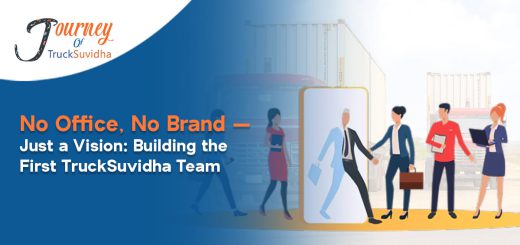The Ones Who Drove But Were Never Heard
A Visit That Was Just to Understand
One of those earlier conversations ended with a thought that lingered: Can we make online truck booking Possible?
But the next step wasn’t writing code or designing an app.
It wasn’t about brainstorming solutions in a conference room.
It was something much simpler.
Something that would become a core part of everything that followed:
Listen. Without judgment. Without assumptions.
So the next day, Amit and Ishu went out for a survey, this time, to where it all actually happens.
To the streets. The mandis. The loading docks.
To meet the ones who keep India’s goods moving — but whose voices rarely make it into the meetings that shape the industry.
A Night That Changed the Perspective
One night in 2013, around 1:30 AM, they decided to do something most wouldn’t:
A real-time night survey at Azadpur Mandi.
Amit believed — rightly so — that those who drive through the night deserve to be heard in the night.
He looked at Ishu and said,
“Tonight, you talk to them. One-on-one. No filters. No scripts.”
Amit had grown up around industrial zones. He spoke the language.
But Ishu had spent the last few years in the corporate world.
This was a different world. One he needed to step into — and feel.
Ishu scanned the area and decided to approach a truck from Uttar Pradesh, thinking he could build a connect through common roots.
The driver was resting in his cabin.
Ishu walked up and politely called out:
“Sir, aap niche aaiye, aapse kuch aapke fayede ki baat karni hai.”
The driver didn’t respond.
Ishu tried again:
“Sir, please ek minute suniye — aapke hi fayede ki baat hai.”
The driver silently closed the cabin door —
then, with folded hands, said firmly:
“Sir, aap chale jaiye. Mujhe aapse koi baat nahi karni.”
Ishu was stunned.
Confused. Even a little shaken.
He turned to Amit and asked,
“Why did that happen?”
Amit didn’t say anything.
Instead, he walked Ishu to another truck nearby where a group of drivers was chatting inside the cabin.
Without hesitation, Amit stepped in and joined them.
Ishu followed.
What followed was a 55-minute conversation full of raw stories, laughter, frustration, and truth.
One line, in particular, stuck with them:
“Koi chakkar hi nahi hai, sahab.”
(There’s no problem, sir.)
As they walked back, Ishu asked Amit again,
“Why was the first driver so dismissive?”
Amit looked at him and said:
“Look at your clothes. The notepad. The pen. Your body language.
You looked like someone here to take notes — not understand.
If you want to be part of this world, first blend into it.”
That night didn’t give them answers.
But it gave them the truth:
You don’t earn trust by asking questions. You earn it by showing up as one of them.
No Big Entry, No Flashy Plans — Just a Willingness to Listen
Amit and Ishu didn’t arrive with flyers or sales pitches.
There were no presentations or surveys.
Just two people, trying to understand.
They walked slowly through industrial lanes, stopping at tea stalls, weighing sheds, and truck bays.
From the outside, it looked like just another day in Indian logistics:
Men shouting across yards, goods being loaded, and drivers sleeping inside trucks waiting for their turn.
But underneath all that motion — they noticed something else.
Read More:- Where It All Began — The Spark Behind What Would One Day Become TruckSuvidha
People Were Doing Their Jobs — But Holding Back
Inside the truck union, some workers were sitting on wooden benches. The register was open on the table. Fans spun slowly above their heads. The scene was calm — almost peaceful.
Everyone seemed settled in their work.
Manual records. Repeated calls to drivers. The usual shuffle of pages, dates, and vehicle numbers.
There was no chaos. But also, no eagerness to talk.
One broker leaned forward, as if ready to speak — then didn’t.
A small fleet owner kept checking his phone, pretending not to listen.
The message was clear:
They were happy doing what they’d always done.
But they didn’t want anyone stepping into that space — not yet.
Why So Quiet?
It wasn’t that they didn’t have anything to say.
They just weren’t sure if saying it would change anything.
People had come before. Asked questions. Promised ideas.
And then… nothing.
So now, when someone new walked in asking questions, they chose silence over stories.
One man finally whispered to another,
“Puchne toh sab aate hain. Sunta kaun hai?”
(Everyone comes to ask. But who really listens?)
That line stayed in the air.
Even the Younger Ones Stayed Careful
In one corner, a younger driver — early 30s, blue shirt — looked like he wanted to say something.
He kept turning his pen in his hand.
Listened carefully. Watched the group.
But he didn’t speak.
He probably had thoughts. Maybe even questions.
But when no one else is talking, the safest thing to do is stay quiet.
They Had Made Peace With Their Manual System
What stood out wasn’t that they didn’t want improvement.
It’s that they didn’t want to risk their stability for it.
Because in their world — manual bookings, verbal confirmations, ledger entries — everything was predictable.
Old-school. Yes.
But familiar. Safe. Functional.
So when someone asked, “Would you be open to changing the system?”
They didn’t say no.
They just stared.
One Man Said It Best
He finally spoke. Not loudly. Just enough to hear.
“Kaam ho raha hai. System chal raha hai.”
(Work is happening. The system is running.)
That was his truth. And the truth of everyone sitting beside him.
They didn’t want disruption.
They didn’t want someone to fix things that weren’t broken — at least not in their eyes.
And Then Came the Mention of the Survey
As conversations slowly opened up, one of the visitors mentioned something — a survey that had reached more than 6,000 truck drivers, fleet owners, transporters, booking agents across regions.
The insight?
Most drivers don’t travel far.
They stick to local areas. Same customers. Same routes. Same challenges.
And it made sense now.
This system — local, tightly held, slow to change — wasn’t a glitch.
It was by design.
Because the farther you go, the more unknowns you face.
And in this line of work, unknowns are risky.
Not Resistance. Just Reluctance.
It’s easy to say people were against change.
But that’s not true.
What they saw was something else — a deep-rooted reluctance.
To open up.
To try something new.
To let someone else into a system they’ve managed, protected, and survived in for decades.
And until someone earns that trust — really earns it — silence is safer than sharing.
That Visit Didn’t End With a Plan
They didn’t walk out with action items.
They didn’t leave with a list of problems to fix.
But they left with something better — clarity.
Clarity that people don’t just need solutions.
They need to be understood.
They need someone who’s not there to impress them — but to sit with them, listen, and ask nothing in return.
Because only then, slowly, carefully, will they begin to speak.
And once they speak — the real work can begin.




Recent Comments